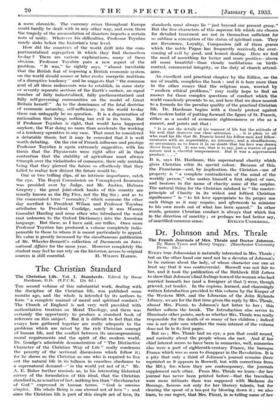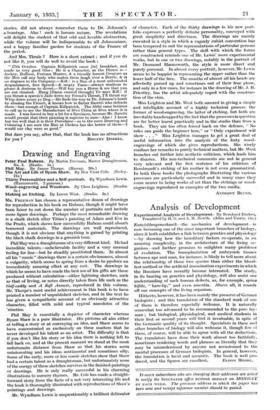Dr. Johnson and Mrs. Thrale
EVERY true Johnsonian is naturally interested in Mrs. Thrale ; but on the other hand one need not be a devotee of Johnson's to be curious about the lady, of whose character one can at least say that it was controversial. Boswell was not fair to her, and it took the publication of the Birkbeck Hill Letters to show that Johnson's final feelings toward thewoman who had married beneath her (and a foreigner at that !) were, though grieved, yet tender. In the copious, learned, and charmingly written Introduction provided to this volume by the Keeper of the Western MSS. and the Librarian of the John Rylands Library, we are for the first time given the reply by Mrs. Thrale, almost Mrs. Piozzi, to Johnson's last letter to her ; this further softens the break. The Introduction also serves to illuminate other points, such as whether Mrs. Thrale was really responsible for the death of so many of her children ; indeed one is not quite sure whether the main interest of the volume does not lie in its first pages.
But no ; Mrs. Thrale had an eye, a pen that could record, and curiosity about the people whom she met. And if her chief interest seems to have been in nunneries, well, nunneries. also were a part of eighteenth-century France, the baroque France which was so soon to disappear in the Revolution. It is a pity that only a third of Johnson's journal remains (here reprinted as it appears in Boswell, but with corrections from the MS.), for, where they are contemporary, the journals supplement each other. From Mrs. 'Made we learn—for her journal has never been printed before—that the travellers' were more intimate than was supposed with Madame du Boccage, famous not only for her literary talents, but for clearing the spout of a tea-pot by blowing down it ; we also learn, to our regret, that Mrs. Piozzi, in re-telling some of her stories, did not always remember them to Dr. Johnson's a ivantage. Alas ! such is human nature. The revelations will delight the student of that odd and lovable abstraction, while the volume will be indispensable to all Jolmsonians, and a happy familiar garden for students of the France 9f the period.
And Mrs. Thrale ? Here is a short extract ; and if you do not like it, you will do well to avoid the book :
"27th October. Captain Killpatrick came [to] breakfast, and made us very good Glee : He is a Character, as the Phrase is— Jockey, Buffoon, Fortune Hunter, & a friendly honest Creature as the Men call any body who makes them laugh over a Bottle, & is no disgrace to the Company.—Kill : is a Man of a most unbounded -Acquaintance, free Speech--& empty Purse—always studious to please ki desirous to divert,—Will buy you a Horse & see that you are not cheated. Hang [Damn crossed through] Ye says Kill if Whip thrust a spavin's Jade down my Friend's Throat, I'll thrust my Whip down yours ye Dog.—He finds the way to Dr. Johnson's heart by abusing the French, & knows how to flatter Baretti who defends them—but enough of Captain Killpatrick. The Abbe came betimes to call us to see the Manufacture of Seve China at Sive where it is made. I was forced to buy a bit for a Specimen, because Mr. Baretti would,persist that their painting is superior to ours—Alas ! I know but too well that it is their Porcelaine—as to the mere Drawing and Colouring I sin sure the Man at Chelsea has the better of them—I would our clay were as good."
But dare you say, after that, that the book has no attractions





































 Previous page
Previous page